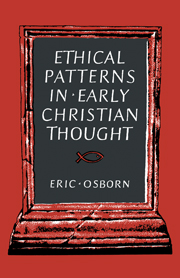1 - NEW TESTAMENT
Published online by Cambridge University Press: 12 November 2009
Summary
Even if we like diversity, the task of sketching New Testament ethics at first seems formidable. As well as variety of expression there is variety of setting. Every part of the New Testament must be understood against its historical background and the framework of the book in which it is found. We cannot take statements of Matthew and blend them with verses of the Apocalypse. One work is written in the face of the challenge of Judaism redivivus and the other in the face of Nero redivivus. There is a difference of style but that is the smallest thing. The same could be said about the differences between the three Synoptics, Matthew's new law, Mark's mysterious son of man and Luke's world church, even before we move on to the Fourth Gospel with its lord of glory and its community under the word. However, ethical patterns can guide us through this diversity. ‘What then does the New Testament effectively provide, in ethics as in doctrine? It yields certain perspectives, patterns and priorities and it forms the Christian mind which then turns to the examination of contemporary issues.’ The four main patterns are righteousness (or justice), discipleship, faith and love. We glimpse their New Testament outlines before considering their later development.
RIGHTEOUSNESS
Righteousness dominates two parts of the New Testament–the Epistle to the Romans and the Gospel according to Matthew.
- Type
- Chapter
- Information
- Ethical Patterns in Early Christian Thought , pp. 15 - 49Publisher: Cambridge University PressPrint publication year: 1976



